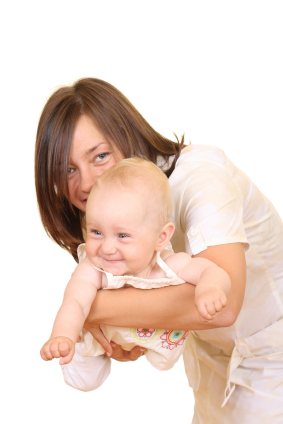Your baby’s development at around 2 months
April 29, 2008
By now, numerous nights with little sleep are compensated with the most gorgeous baby smiles! Your baby can recognize your face and shows real excitement when you talk to him by moving his arms and legs. The little fists open and close while he may already be able to hold a bite ring in his hands. When baby is on his tummy, he can also hold his head up for a few seconds. Though baby trains his neck, tummy and back muscles very hard, it is still necessary to hold his head when lifting him up.
Baby may already be able to imitate facial expressions, such as movements of the mouth. Try to stick out your tongue and see what happens – if nothing else, you will certainly get a big smile!
Baby’s understanding of the world starts slowly to become structured into moving versus static things and people versus things. He is now capable of concentrating and focusing on something, such as a moving rattle or a bell. He can also follow things of interest with his eyes and turn his head.
By about 2 months, baby’s so-called “oral phase” begins as baby takes everything, including his fingers and hands, into his mouth. Developmentally, this phase is plausible as baby’s senses are strongest in his mouth. So even if you worry about hygienic standards, this part of baby’s development is essential in order for him to understand what is going on around him.
If your baby starts sucking his thumb, let him do so. This is also part of his development and calms him. The choice of dummy is only the second best option as parents are constantly on the look out for the lost dummy – not to mention the times they have to get up at night in order to give baby his dummy back.
And even dentists agree that sucking the thumb does not necessarily cause the teeth to deform!
For more articles and parenting inspiration visit http://www.babysbest.co.uk
All you need to know about Baby Yoga
February 8, 2008
Yoga is well known for its relaxation and body strengthening benefits for adults and children. Baby yoga is equally stimulating and offers tremendous health benefits for both caretaker and baby.
Experience has shown that babies love this practice as it allows them to spend time with their care taker in a setting that both can enjoy. It is a fantastic way to support the active bonding process while baby and parent relax or practice together.
Baby’s health improves as it helps to strengthen the muscles and develop physical balance, thus enhancing baby’s motor and neuromuscular development. Gentle yoga techniques massages internal organs which in turn helps relieve any tension. As a result, it improves baby’s digestion and eases the symptoms of colic and constipation. In addition, physical stretching allows baby to breathe more easily and deeply and thus supports the development of baby’s immune system. Some also say that yoga in particular helps to improve baby’s sleep.
 The care taker benefits greatly too: the deep relaxation process during the yoga session helps new parents to cope with the stresses of early parenthood and to build their confidence in handling their infant. It is important to reduce stress and anxiety about the new arrival in order to promote and maintain a healthy bond between parent and baby. What is more, it is a fantastic way to learn methods of calming the baby.
The care taker benefits greatly too: the deep relaxation process during the yoga session helps new parents to cope with the stresses of early parenthood and to build their confidence in handling their infant. It is important to reduce stress and anxiety about the new arrival in order to promote and maintain a healthy bond between parent and baby. What is more, it is a fantastic way to learn methods of calming the baby.
Baby yoga classes are based on relaxing music and movements and take place in a very friendly setting. Participants are usually very open-minded so it is very likely to find new friends easily.
Baby yoga is extremely enjoyable and relaxing as parent and baby learn so much about themselves and each other. It is a helping hand for a healthy start in life!
For more information about baby activities and their benefits visit www.babysbest.co.uk



